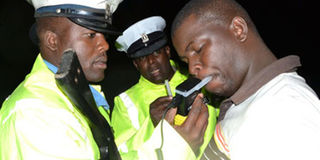We have drivers to take you home, say bar owners

When the breathalyser was reintroduced in December to curb drink driving, a bar owner in Nairobi’s Ngong Road observed in frustration the sharp decline in the number of customers. That was when he decided to offer a “guarantee” against the gadget popularly referred to by the brand name Alcoblow: employing five young men to drive his drunk customers home at a fee of Sh500. PHOTO/FILE
What you need to know:
- By mid-January, he knew he had to do something to salvage his business especially after his most loyal customers kept off, opting instead, for bars close to their homes.
- The new service, which the bar owner announced through text messages to loyal customers and waiters serving drinks, has seen a steady increase in the number of customers.
When the breathalyser was reintroduced in December to curb drink driving, a bar owner in Nairobi’s Ngong Road observed in frustration the sharp decline in the number of customers.
By mid-January, he knew he had to do something to salvage his business especially after his most loyal customers kept off, opting instead, for bars close to their homes.
That was when he decided to offer a “guarantee” against the gadget popularly referred to by the brand name Alcoblow: employing five young men to drive his drunk customers home at a fee of Sh500.
The new service, which the bar owner announced through text messages to loyal customers and waiters serving drinks, has seen a steady increase in the number of customers.
Such is the extent bar owners have had to go to protect their turf in reaction to what they consider unfair treatment by the government.
And such creativity is what Coast-based hotelier, Mr Mohammed Hersi, is proposing instead of constant complaints.
“My fellow industry players should look for ways to handle the crisis instead of asking the government to suspend the measure,” he said.
“Get drivers to drive your clients’ cars home safely. I am sure many would even pay for that service, it’s cheaper than the fine.
For their return back to base, get a boda boda to bring back your designated driver for the next assignment. Voila!”
This is one of the tactics most pub owners are employing to stay afloat as the list of winners and losers in the Alcoblow saga becomes clear.
Top on this list are the livelihoods of over 500,000 Kenyans, who the Responsible Alcohol Drinks Companies Association (Radca) – consisting of major brewers and marketers — say earn a living directly from dealing with legal alcoholic products.
The number is even higher when the illicit and traditional liquors are factored in, according to economist X.N. Iraki.
“If you factor in the inputs from illicit brews, and the multiplier effect, the number could be higher.
Illicit brewing is part of the underground economy whose statistics are hard to get,” he says.
Mr Nikhil Hira, a tax partner at Deloitte, says a sizeable number derive their livelihoods from the illicit brews industry but it is hard to quantify given the nature of the business. “This is common with many of the informal sector industries,” he says.
Stakeholders say the source of livelihood is under threat as the government continues to tighten the noose on alcoholic products with higher taxes and regulations that may reduce consumption.
Even the taxman, who raises five per cent of his total revenue from taxing alcohol products and levies accrued from the hospitality industry, has cause to worry.
Radca managing trustee Ken Kariuki says the alcohol industry is a major contributor to excise, value added tax and corporate tax.
“Aside from this, there is a huge secondary industry that relies on the alcohol sector as part of their income,” says Mr Kariuki.
These may include taxi operators, butchers and commercial sex workers, whose trade largely depends on the alcohol industry.
Mr Gathua Gitonga, a trustee of the Pubs, Entertainment and Restaurant Association of Kenya (Perak), says moves such as the “haphazard use of the breathalyser” threaten thousands of jobs. Indeed, he claims, some entertainment facilities have already laid off staff — Perak is still compiling the exact figures.
“We are not against the Alcoblow but we are asking why it is being applied selectively,” says Mr Gitonga. There is a suggestion that only those suspected of driving erratically should be tested.
But the National Transport and Safety Authority (NTSA) chairman Lee Kinyanjui has dismissed the claim, saying government revenues and people’s livelihoods are protected.
While agreeing that bars in the central business district and along highways of Nairobi and other major towns are feeling the pinch, Mr Kinyanjui maintains that those in the estates are laughing all the way to the bank.
“What has happened is a redistribution of wealth and we welcome that,” he says. “Have you heard the owners of the estate bars complaining?”
But Perak claims Alcoblow is unfairly used to target motorists in affluent estates like Kilimani, Runda and Lavington in Nairobi — places where there are usually few accidents.
But Mr Kinyanjui says the police cannot be stationed in informal settlements because most residents do not have cars. He also says the gadgets have been used in Kangemi, Thika and Outering Road.
“We will not take instructions from the bar owners on where to station the Alcoblow,” he says.
Bar owners also say that private motorists contribute seven per cent of the national number of accidents yet all the energies are directed towards them.
“We want to see the Alcoblow in operation during the day because matatus cause the highest number of accidents and the drivers are usually drunk,” says Mr Gitonga.
But Mr Kinyanjui says other measures like the ban on night travel are being used to ensure road safety.
At least 3,000 people were killed in road accidents last year even though it is not clear how many of the deaths are attributed to drunken driving.
Taxi operators are also big winners because more motorists now engage their services after night-outs to avoid the hefty fines of drunken driving.
“If I plan to drink and engage the services of a taxi driver, is that not a new opportunity? Have you heard the taxi operators association complaining?” asks Mr Kinyanjui.
Beyond these there are groups of people who wait a few metres to police roadblocks. They usually stop those thought to be driving under the influence of alcohol and drive them past the roadblocks at a fee of Sh500. It is, however, not clear if this crop of enterprising Kenyans that advertises its services on social media is getting enough business due to security concerns.
But the next cluster of beneficiaries is the most interesting. These range from traffic policemen who take bribes from drunken motorists. Mr Peter Murima of the Motorists Association of Kenya says there have been many complaints that the police are asking for bribes to let drunk drivers off the hook.
In some cases, the Traffic Act provides for fines of up to Sh500,000 for offending motorists while those caught driving under the influence can be fined a maximum of Sh100,000.
“All motorists convicted of drunk driving have been fined Sh20,000 so the police, who used to ask for Sh500, cannot take anything below Sh10,000,” said a disgruntled driver.
But Mr Kinyanjui denies the assertion, saying police have even arrested wealthy Kenyans who have been subjected to the full judicial process.
“We have arrested very senior and wealthy Kenyans and if it was about the money, they would not have been taken to court,” he says.
Mr Gitonga claims the breakdowns used to tow vehicles of arrested motorists belong to police officers. “Over and above the Sh20,000 fine in court, you are forced to pay Sh10,000 for the breakdown service,” he said.
But Traffic Commandant Samuel Kimaru dismissed the claims, saying an internal investigation had established the breakdowns are not owned by policemen.
“We have to secure your car and the law allows us to tow it to the nearest police station at your cost,” said Mr Kimaru. “I have directed all the stations to benchmark the towing rates with those of AA Kenya to safeguard motorists from being exploited.”





